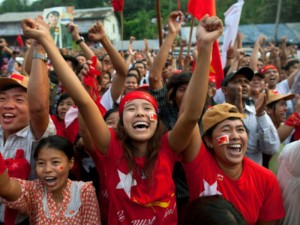CCA Congratulates the First Civilian President of Myanmar after 50 years of Military Rule

Photo Courtesy: Indo-Asian News Service
Christian Conference of Asia (CCA) congratulated newly elected President of Myanmar Mr. Htin Kyaw, the first civilian elected to lead the country after more than 50 years of military rule.
In a letter of congratulations addressed to the newly elected president of Myanmar, CCA General Secretary Dr. Mathews George Chunakara stated, “Myanmar’s recent presidential election could be an important milestone in Myanmar’s democratic transition. May the efforts by the new president and his government forge reconciliation and sustained peace in the country".
The CCA's General Secretary also added that, “the victory of the National League for Democracy (NLD) under the leadership of Aung San Suu Kyi during the general election in the country in November last year reflected the hope and aspirations of the Myanmar people for a genuine peace to move beyond conflicts. Now all key stakeholders, including the military, have demonstrated their political maturity as well as a commitment to work together for the people of Myanmar, who have been longing for peace with justice”.
“The outcome of the previous parliament election as well as the presidential elections were remarkable achievements due to the sacrifices of numerous people who struggled for justice, peace, freedom and human rights. We pray God’s divine grace further lead the country and its rulers to fulfil the people’s aspirations and an orderly transition to a democratic government”, he added.
The NLD, under the leadership of Daw Aung San Suu Kyi, won a historic parliamentary election, held in November 2015. However, Ms. Suu Kyi, who made tireless efforts and sacrifices over so many years failed to persuade the military to allow a clause in the Constitution barring her from the presidency to be overruled. Under the clause Suu Kyi cannot be elected as the president as her two sons are holding British citizenship.
The long history of military rule in the country fuelled ethnic conflicts, gross violations of human rights and political imprisonments.
CCA has been concerned and consistently worked for peace and reconciliation in Myanmar over the years.










